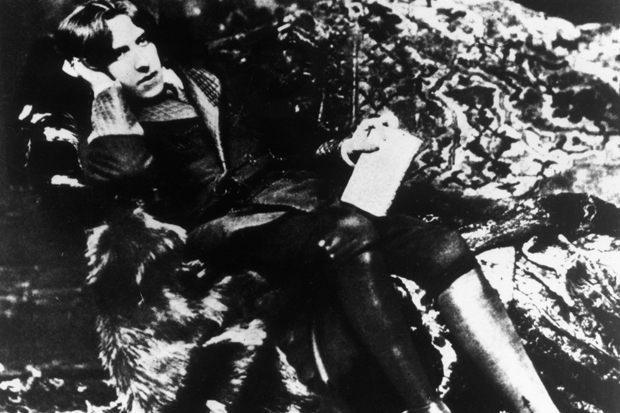The prodigious brilliance, blaring public ruin, dismal martyrdom and posthumous glory of Oscar Wilde’s reputation are almost too familiar. The facts have been rehashed in numerous biographies, and dramatised by such actors as Robert Morley, Peter Finch, Rupert Everett and Stephen Fry. The only way to attack the subject with any hope of surprise is by an oblique sideways move from an unexpected angle. This was Robert Maguire’s method in Ceremonies of Bravery (2013), an intriguing account of Wilde’s friendship with the man-about-town Carlos Blacker and their connection with the Dreyfus affair in France. Another enjoyably tangential contribution is Linda Stratmann’s recent The Marquess of Queensberry: Wilde’s Nemesis.
Two English literature dons, Joseph Bristow and Rebecca Mitchell, have also devised a novel approach to Wilde. Using a notebook held in a copious Wilde archive in California, they demonstrate his creative fixation with Thomas Chatterton, ‘the marvellous boy’ as Wordsworth had called him, a garret poet and impoverished forger who died aged 17 in 1770 of arsenical poisoning. His death was treated as suicide by people intent on romanticising him, although another plausible explanation is that Chatterton took an accidental overdose of arsenical water to cope with the vomiting caused by his self-medication with mercury as a remedy for syphilis.
The notebook has hitherto been degraded by literary historians because Wilde excised pages from the two best known Victorian books on Chatterton and glued them into his cahiers. On this basis, hoity-toity prigs who don’t understand the ways that authors amass their working notes or collect clippings have accused him of plagiarism and literary larceny. It is astounding how grumpy some academics have been about this innocuous notebook, which served Wilde both as an aide-memoire and testing laboratory for ideas and phrases.
Chatterton’s forgeries comprised poems which he pretended had been composed by a 15th-century Bristol monk of his invention. His abundant talents, mischief with authorial provenance and squalid early death have inspired romantics for centuries. Coleridge spent 40 years revising his ‘Monody on the Death of Chatterton’, Henry Wallis’s famous 1856 picture ‘The Death of Chatterton’ now hangs in Tate Britain, and Rossetti’s sonnet to the dead poet was a Victorian favourite. More recently, Serge Gainsbourg celebrated young suicide and madness in his pop dirge ‘Chatterton’ (1967). Peter Ackroyd’s novel Chatterton (1987) followed his fictional Last Testament of Oscar Wilde (1983).
For Wilde Chatterton not only personified youthful talent and fateful destiny, but also exemplified the ways in which the world rewarded bravado with success while weak temperaments were thrust down by failure. ‘Every portrait that is painted with feeling is a portrait of the artist, not of the sitter,’ Wilde wrote in his only novel, The Picture of Dorian Gray. This applies to his own sketch-notes about Chatterton, in which the ostensible sitter is often the occasion for the sketch-maker’s inadvertent self-revelations.
In his notebook Wilde described Chatterton as ‘the father of the Romantic movement in literature, the precursor of Blake, Coleridge and Keats, the greatest poet of his time’. He was touched by the piquant sorrows of Chatterton’s personal history, inquisitive about his fakery and pensive about authors’ magpie borrowings of images from one another. He speculated that Chatterton’s counterfeit poetry arose from adolescent diffidence: ‘This forgery came from the desire of artistic self-effacement.’ It impressed him that Chatterton gave a higher priority to the technical perfection of his writing, even if that meant impersonating a medieval priest, than to personal authenticity or self-expression. In Wilde’s opinion, this made Chatterton one of the least egotistical of poets.
The circumstances of Wilde’s final penury, ostracism and abject death add poignancy to his earlier preoccupation with Chatterton’s failure and demise. His staunch friend Robert Sherard even compared the shabby Paris hotel bedroom where Wilde expired in 1900 to the garret in Holborn where Chatterton took arsenic: ‘All was faded and threadbare. The impression was that of poverty masquerading as comfort.’
Oscar Wilde’s Chatterton is a work of painstaking exhumation, laden with proofs and dense in citations. It is not all heavy going, for the interpretations by Bristow and Mitchell of Wilde’s short stories about impersonation and shamming are succinctly readable. ‘The Portrait of Mr. W.H.’, Wilde’s tale of the suicide and suspected suicide of two men connected to a faked portrait of the beloved youth addressed in Shakespeare’s sonnets, is the most conspicuous case of Chatterton’s influence on Oscar. The relentless close ferocity of scholarly attention given by Bristow and Mitchell to their subject will amaze non-specialist readers. In the introverted hive of Wilde experts, which the two dons depict as irritable and intolerant, it is likely to get the killer bees buzzing.
Available from the Spectator Bookshop, £20 Tel: 08430 600033






Comments